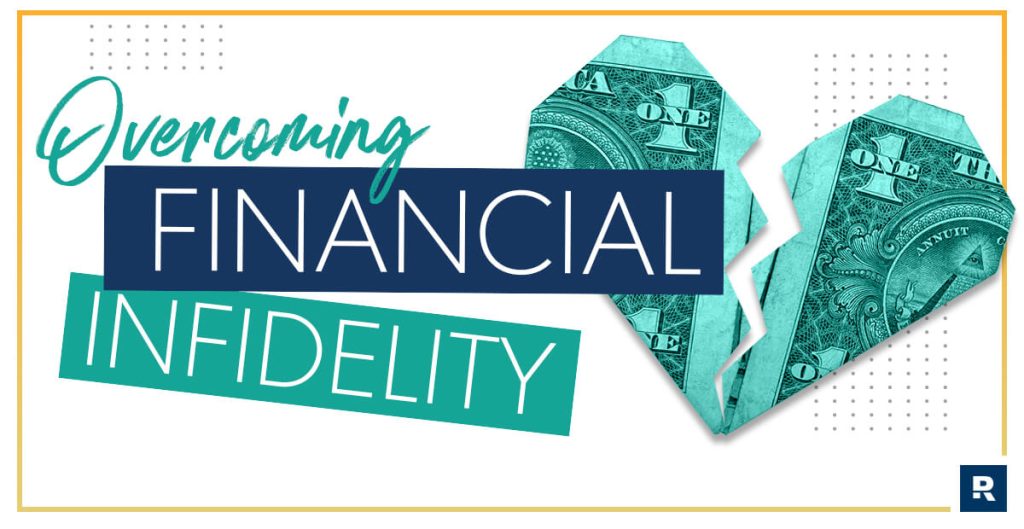Money fights are the worst. Well, let’s face it: All fights are pretty awful. But if you and your spouse (or significant other) have been fighting about money, you’re not alone.
In fact, 41% of married couples say fighting is almost inevitable when they talk about money.1 That’s why it’s so important to keep your lines of communication open. Because when you and your spouse aren’t communicating about money, you can both end up feeling guilty about your spending habits, lying about your spending habits, or worse . . . slipping onto financial infidelity.
Today, I’m shining some light onto financial infidelity: What it is, signs to look for, and how to overcome it.
What Is Financial Infidelity?
Financial infidelity happens when you or your spouse intentionally lie about money. When you deliberately choose not to tell the truth about your spending habits (no matter how big or small), that is financial infidelity.
You might be thinking, Rachel, isn’t that being a little harsh? Sure, it may start out as an innocent purchase here or there. But things go downhill when you start hiding your latest shopping spree purchases and praying your spouse doesn’t find them. Yeah . . . that might be a problem.
Financial infidelity can be pretty serious—especially when it goes on for too long. But just because it’s serious doesn’t mean there’s no hope. If I know one thing, it’s that there’s always hope. Especially in the hard stuff.
Listen: If you or your spouse is dealing with financial infidelity, you’re not alone. In fact, it happens more than you might think. One in three people who are married admit to hiding a purchase from their spouse. And 31% of couples say they have a credit card their spouse doesn’t know about.2
Financial Infidelity vs. Financial Irresponsibility
When it comes to money, there’s a difference between straight up lying and just being irresponsible (or forgetful).
I get asked all the time what the difference is between financial infidelity and financial irresponsibility. A few years ago, a woman came up to me at an event I was speaking at almost in tears. She had just found out her husband had gone out to lunch three times that month . . . and never told her. She was pretty devastated and fully believed he committed financial infidelity.
Listen, you guys—forgetting to tell your spouse that you went to Chick-Fil-A a few times this month is not infidelity. That’s just financial irresponsibility. But if that sweet woman’s husband knew she wouldn’t approve of him spending money at a restaurant and intentionally hid it from her . . . that’s infidelity. See the difference?
6 Signs of Financial Infidelity
I don’t know about you, but financial infidelity is not something I want to invite over for pizza night. It’s like inviting a bear into the front door and being shocked that it terrorized your brand-new throw pillows.
That, my friends, is why it’s so important to keep your money spending behaviors in check (and know what to look for too).
Here are six telltale signs of financial infidelity:
1. Hiding a purchase intentionally.
Relationships are built on trust, and that’s why honesty is the best policy (no matter what). So, if you buy something and hide it from your husband or wife, you’re taking a dive in the deep end. Remember, a budget is the best way to get on the same page—and spend money guilt free.
2. Getting cashback without telling your spouse.
This one can seem fairly harmless, but cashback rewards on your debit card purchases can add up pretty quickly. It may start out as a harmless $10 here or $20 there. But before you know it, you could be pulling out some serious cash without telling your spouse. Not only will your bank account start to dwindle, but so will their trust. Ouch.
3. Having a secret savings account.
This one is tough. When you and your spouse are on the same page about money, you’re probably on the same page about your money goals. A secret savings account will only put a wrench in your family’s money goals.
4. Stashing bills.
I love birthday cash. I love knowing that I have my very own “stash” of cash to spend however I want. But when stashing cash goes beyond the gifts and moves into stashing paychecks, that’s another story.
5. Opening secret credit cards or new accounts.
Sometimes people open a secret credit card or bank account to make it easier to hide their spending from their spouse. I’ve already said that kind of thing is off-limits. But other times, one spouse is desperately trying to hide a financial mess by transferring credit card balances or taking out loans to pay the bills—all without telling their spouse. The damage you’re doing trying to “fix” the problem could be worse than the problem itself. If you’re further into debt than you care to admit, there’s hope. And it’s time to come clean.
6. Playing the dollar-for-dollar game.
Does your spouse have an expensive hobby? Maybe they golf, hunt or love to skydive for fun. Those things aren’t cheap. It’s easy to tell yourself that you should be able to match what your husband or wife is spending on their favorite things. In theory, that’s true. But you both need to agree to that plan and include it in your budget. Spending freely without your spouse’s knowledge is a dangerous game. If that’s you, quit while you’re ahead.
Read the full article here










